David Klein's Blog, page 61
August 26, 2020
Words to Live By: Accept

It’s known as the Serenity Prayer:
“God grant me the serenity to accept the things I cannot change, the courage to change the things I can, and the wisdom to know the difference.”
It’s the kind of saying that appears on a poster taped to the ceiling in the dentist’s office and you can look up and read it while you’re getting your teeth drilled. It’s a cliche, and like most writers, I am locked in mortal battle against cliches.
Plus, I don’t pray and I don’t believe in God. Not a bit. I’m more of an evolutionary science type of disciple.
And yet, there’s one word in that prayer that keeps haunting me: Accept.
I say haunting because the idea of acceptance lingers in my consciousness, persistent and recurrent. But I haven’t always been the most skillful or graceful accepter, which is a problem because this fall, I need to summon all the acceptance I can muster up.
Three huge impacts on my life are looming:
My agent will be shopping my latest novel, THIS GAME WE PLAY, to publishers.There is a presidential election that is giving me serious jitters.My young adult daughter had decided to take on the challenge of a lifetime.
The source of my angst is that I have no control over the outcome of any of these three situations. I can’t do anything except wait, hope, and cast magic spells. And I must accept whatever happens. I’m just not sure how to do that.
Another word to live by: Savor
I’ve also adopted savor as a word to live by. Recently, I’ve savored the mundane task of shaving and I’ve also savored wind chimes when there has been no wind and underripe raspberries.
The post Words to Live By: Accept appeared first on by David Klein.
August 24, 2020
Happy Anniversary to My Blog
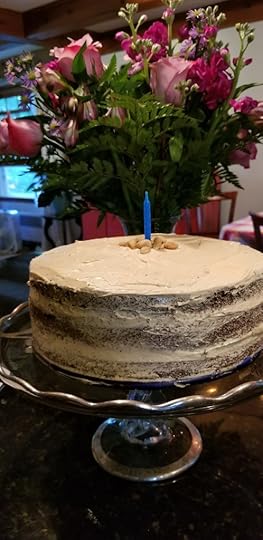
That’s not really an anniversary cake, that’s Harriet’s birthday cake, which she had to bake for herself, guaranteeing that it would be amazing, and it was.
So I’m co-opting that cake to celebrate the 1-year anniversary of my blog. I’m late to blogging, very late. I know that. Blogs are so some other era. But I wanted to expand my range of writing and take ten minutes to finish a post rather than two years to write a novel.
I’ve come to like the quick, creative energy I drum up to write a blog post. I rarely write more than a single draft (it probably shows) other than to check for errors. That’s half the beauty of writing a blog that few people read: the stakes are low. I can write whatever I damn well please.
In honor of this anniversary, I’ve selected a few favorite posts from the 109 I’ve written over the past year. Here they are:
On my experience as a writer
My Brilliant Career outlines how I became a writer.
My First Novel Was a Disaster, but hey, I was a beginner.
A couple of short stories: GET WHAT YOU WANT and FOOD TRUCK.
I got into SIX-WORD MEMOIRS. Boy, are they short.
Exploration of self
The Art and Science of Savoring
Dog Person, Cat Person, People Person
Racism: A Personal Introduction and More on My Experience With Racism
My coronavirus diary
COVID-19 Has Reached the Cottage
How COVID Has Impacted Me So Far
Dinner with Family–and the Mob
To my parents
I wrote something about both my mom and dad:
The post Happy Anniversary to My Blog appeared first on by David Klein.
August 21, 2020
The Most Effective President
I’ve come to the conclusion that the current occupant of the White House might be the most effective president ever. With an agenda to sow divisiveness among Americans, to pit us against each other, to hurl insults and foster hate, he’s been astonishingly successful.
Sadly, I’m a perfect example of his success.
There’s a house down the street and around the corner from me. I don’t know who lives there. They are flying Trump 2020 flags and their lawn features Trump/Pence campaign signs. And every time I go past that house I fantasize about throwing a brick through their window, or getting into a heated confrontation with the homeowner, or stealing their signs and flags.
What have I come to? I’ve never been a violent person. I got into a few scrapes in my elementary and high school days, but I didn’t like fighting. I didn’t want to get hit or hurt. But now, decades later, I play out these violent scenarios in my imagination.
The fact is I have no respect for anyone who supports 45. I have no empathy for those who want to tax the poor and help the rich, rather than tax the rich and help the poor. Who turn a blind eye to environmental degradation, who strut around with automatic rifles, who disparage immigrants and people of color, who think wearing a mask is a violation of their freedom.
I picture myself actually pummeling them, as if that would teach them a lesson, as if that would make me feel better. That’s how far gone I am. I’m as lost as they are, except I’m at the far other end of the spectrum.
I won’t do it, of course. I won’t get into a violent confrontation. But I can’t control my imagination, I can’t resist the fantasies. What I’m left with is a simmering, shameful anxiety. With feelings of rage and hate. It’s terrible to be this way. It’s unhealthy. It’s depressing.
Congratulations, 45. You’ve done well. May you get your ass kicked November 3.
The post The Most Effective President appeared first on by David Klein.
August 17, 2020
THE UNBEARABLE LIGHTNESS OF BEING, Milan Kundera
What was once light, has now become heavy.
I’m continuing to reread from the list of The Most Important Novels in My Life. I just finished THE UNBEARABLE LIGHTNESS OF BEING, by Milan Kundera.

This novel was published in English in the mid-eighties when I was just starting out as a writer. I wrote and read voraciously and when I discovered Kundera’s unique, philosophical novel I was, to put it less-than-elegantly, completely blown away.
The novel is anchored by a love story between Tomas, a Czech doctor, and his wife, Tereza, a photographer, along with one of many of Tomas’ mistresses, Sabina, and one of her lovers, Franz. The characters operate during the Prague Spring when the Soviet Union invaded Czechoslovakia and its aftermath.
The beauty of the novel, the significance and impact for me, was Kundera’s philosophical and existential musings, the brilliance of the novel’s form, and the author’s insertion of himself into the narrative.
What do I mean by the author inserting himself? Here is a passage:
And once more I see him [Tomas] the way he appeared to me at the very beginning of the novel: standing at the window and staring across the courtyard at the walls opposite.
This is the image from which he was born. As I have pointed out before, characters are not born of people, of woman; they are born of a situation, a sentence, a metaphor containing in a nutshell a basic human possibility that the author thinks no one else has discovered or said something essential about . . . The characters in my novels are my own unrealized possibilities.
For a young writer searching for his own voice and grappling with his own unrealized possibilities as a writer, this was like discovering a treasure. And right in the middle of the story! I folded back many pages, I underlined passages and took notes in the margins, I recommended the novel to anyone I knew who could read. Naturally, I imitated (poorly) Kundera in my own writing.
I’m sure I read the novel several times back then. I saw and appreciated the film when it came out. I pondered the meaning of lightness and weight in my own existence.
Oh, but the passage of time. If time is nothing else, it is change.
In rereading the novel, I found myself distracted at first. Somewhat unengaged. Tomas and his justifications for having mistress after mistress—which seemed enviable back when I was a single twenty-something—now struck me as misogynistic. Sabina’s need to betray others didn’t make as much sense. Only Tereza, victimized by her husband’s philandering, felt authentic to me.
And what I once devoured as brilliant philosophical asides by Kundera now tasted a little preachy, as if the author were lecturing the reader.
But as I read on, I became more absorbed in the novel and when I finished reading I could still appreciate its importance in my personal canon.
Still, maybe I should be more judicious about visiting my past and some of those novels. Maybe some memories should be left alone. It might be asking too much for a novel not only to stand the test of time, but also to sustain personal relevance across decades. A novel’s most devoted readers might change; the novel itself might not keep up.
The post THE UNBEARABLE LIGHTNESS OF BEING, Milan Kundera appeared first on by David Klein.
August 14, 2020
The Most Important Novels in My Life
I have set myself a task for 2020: reread the ten most important books in my life. To qualify for the list, the novel (or novella or short story collections; I’m including those also), must meet one or more of the following criteria:
It was so profound and meaningful to me that I’ve read the novel multiple times.It significantly influenced my own development as a novelist.The experience of reading the novel is inexorably linked to and illuminates a moment or period of time in my life.
It’s going to be challenging to pick the ten books. I’m not concerned that I’ve forgotten any important book, because if I have, then that book by definition wouldn’t qualify for the list. I’ve started with 25 titles, from which I must cull down to ten.
Why am I doing this? I’m interested in how the passage of time and accumulation of life experiences have changed how I feel about a book that I once placed on a high pedestal. Has the book stood the test of time? Have I? What’s changed?
For now, I’m listing my initial list of 25, in no particular order, and without explanation. When I get down to ten, I will provide context as to why I chose each one to read again.
UPDATE: I’ve re-read some on this list of 25 and updated their status below
UPDATE 2: I may not get the list narrowed to ten, but am offering reviews of those I have re-read.
THE WORLD ACCORDING TO GARP, John Irving . Prob won’t crack top ten. I think I liked THE CIDER HOUSE RULES and A PRAYER FOR OWEN MEANY better.AMERICAN PASTORAL, Philip RothSELF-HELP, Lorrie MooreA FARWELL TO ARMS, Ernest HemingwayA VISIT FROM THE GOON SQUAD, Jennifer EganTHE SLAP, Christos Tsiolkas THE EXORCIST , William Peter Blatty. Quite a read, but may not belong on the list.DUNE, Frank HerbertCAT’S EYE, Margaret Atwood THE UNBEARABLE LIGHTNESS OF BEING , Milan Kundera. Such an important novel back then. I still appreciate its influence on me. THE ROAD, Cormac McCarthyIN THE GARDEN OF NORTH AMERICAN MARTYRS, Tobia WolffLITTLE CHILDREN, Tom Perrotta SMILES ON WASHINGTON SQUARE, Raymond Federman . My introduction to experimental fiction. Belongs on this list.10:30 ON A SUMMER NIGHT, Marguerite Duras. Off the list, didn’t stand the test of time. Pretentious, obtuse, overwritten. THE CATCHER IN THE RYE, J.D. SalingerA PALE VIEW OF THE HILLS, Kazuo Ishiguro LOVE IN THE TIME OF CHOLERA, Gabriel Garcia Marquez . Likely top ten. It’s the writing, stupid. Many have imitated, but there’s only one GGM. BELLEFLEUR, Joyce Carol Oates THE HOURS, Michael Cunningham . Top ten. A pattern here: it’s the writing. And the structure. LEGENDS OF THE FALL, Jim Harrison . Specifically, the novella “The Man Who Gave Up His Name.” Grandfathered onto this list.THE THINGS THEY CARRIED, Tim O’Brien MARIETTE IN ECSTASY, Ron Hansen . Likely top ten. The writing and language is incredible. The setting of the convent like another world. THE ACCOMPLICES, Georges Simenon . Certainly not a great novel, but it is a short, fascinating character study that made a strong impression on me.WHAT WE TALK ABOUT WHEN WE TALK ABOUT LOVE, Raymond Carver
The post The Most Important Novels in My Life appeared first on by David Klein.
August 13, 2020
The Savoring Never Ends
I savored shaving. I savored the wind chimes. Today, the raspberry gets its turn.
I learned about the importance of savoring, early in the era of COVID-19, during this much-needed and free online course at Yale, “The Science of Well-Being.”

This is my second crop of raspberries this year. The first crop I greatly savored, every afternoon in my yard, peering into the bushes and parting leaves. Picking the berries that had ripened that day. Eating as I picked.
But despite this not being the greatest day and I could really use some raspberry savoring, this second crop isn’t ripe. Not a one berry. Sure, those couple of pink berries caught my eye among the crowd of hard caps, but they are in no way ready. Another day or two, at least.
Still, I can’t resist. I pick one of the pink ones and eat it. That sour raspberry taste, that hard little kernel–I really savored it.
The post The Savoring Never Ends appeared first on by David Klein.
August 12, 2020
What’s in a Title? A Lot
The title of a novel isn’t as important as the content of the novel itself, but I want to love my title. I want others to love it. I want the title to draw in potential readers, pique their interest, motivate them to take a look at the book. I want the title to make a promise.
That’s a heavy load to carry for just a few words. Some of the greatest titles ever were a single word: BELOVED. ATONEMENT. FRANKENSTEIN. JAWS. CARRIE. STASH.
It was last November that I came up with the working title of my most recent novel: THE SUITOR.
Two words–but referring to one character, entity, or concept. THE GODFATHER. THE HOURS.
The novel centers on a sudden relationship that develops between a recent college graduate recovering from a traumatic event and an ambitious and charming schemer, and her father’s attempts to prevent their marriage.
I like the title THE SUITOR. The story is propelled by Anna (college grad) and Kyle (the suitor) quickly falling for each other over one summer, but there is also a central conflict between Kyle and Art (Anna’s father). Without Kyle, no conflict, no story. I found the word suitor intriguing, almost sinister, in a contemporary setting.
I’ve finished the novel. It’s with my agent, who will pitch it to publishers. But she wants me to consider alternative titles. She says it sounds a little old-fashioned, like a gentlemanly caller. The novel is anything but old-fashioned.
So I’m giving the the title some thought. Here are three other potential titles I’m considering:
SOME KIND OF GAME. This title references a fantasy game that Kyle invented for him and Anna to play: opening a restaurant together, someday getting married. There’s also a point in the novel where Art is threatening Kyle and says something to the effect of “You think this is some kind of game we’re playing?”
A COUPLE OF BUMPS. One of Anna’s conflicts is she gets sucked into the partying world as a way to deal with other issues, and on a number of occasions, many occasions, she does a few “bumps” of cocaine with Kyle and her friends. Also, at one point Art is worried about his daughter and thinks “Some things hadn’t gone her way. She’s had some bad luck and hit a couple of bumps and Kyle was a danger to her.”
THE RUSH. Another two-word title and a late entry, suggested by one of my readers because of “the speed of their relationship, restaurant rushes, the rush of the drugs and alcohol depended on to numb the rush of trauma, as well as the rush of the need to see what comes next [in the story]. This title makes a promise to the reader.
I think I’m eliminating A COUPLE OF BUMPS. Many readers may not know the cocaine reference of bumps and the title doesn’t seem large enough for the novel. That leaves THE RUSH or SOME KIND OF GAME. I’m leaning toward THE RUSH. But I just thought of a variation that I like: THIS GAME WE PLAY. Suddenly I want that. In any case, if a publisher buys the book–always a big if–they’ll change the title if they want to.
The post What’s in a Title? A Lot appeared first on by David Klein.
August 10, 2020
How COVID Has Impacted Me So Far
I add these posts under the category “Coronavirus Diary” but I don’t write much about the impact of COVID-19. Turns out it’s just one of many negative impacts on our lives these days. I couldn’t have a blog category for each misfortune–the list would be too long.
And the impact on me has been a lot less than it’s been on millions of others. So I should appreciate that.
Impacts so far of COVID-19 on me:
Socializing isn’t a priority, but it turns out I’m good at social distancing.I’ve tuned out the possibility of travel, other than necessity. I wear masks when needed and wash my hands when I can. I’ve mostly forgotten about touching my face and hope I don’t do it when I shouldn’t. I miss my siblings and our house in Canada.I read the very distressing news and get even more distressed. I’ve given blood twice, which is not an easy or comfortable process, but one way I can give back. I’m summoning spirits to deliver us a Trump loss in November. A big, big, very good, and landslide-like loss. Not only Trump. McConnell too.At times, certain substances have been consumed at higher rates in an attempt to alleviate anxiety and improve mood. At times, this has helped.I continue to work from home, so no change there. Except Harriet works from home now, too. We’ve each got our spaces. All is smooth. It’s the kids I feel bad about. Two of college-age. There’s a lot to miss out on for young people. There’s a lot of disruption. Much not is going the way they had planned, or hoped, or wanted. Life lesson, I suppose. The world does not care. But I care, and I have to manage that distress. They’re young, but they are already strong. They inspire me to be better and do the right thing and feel the right way.
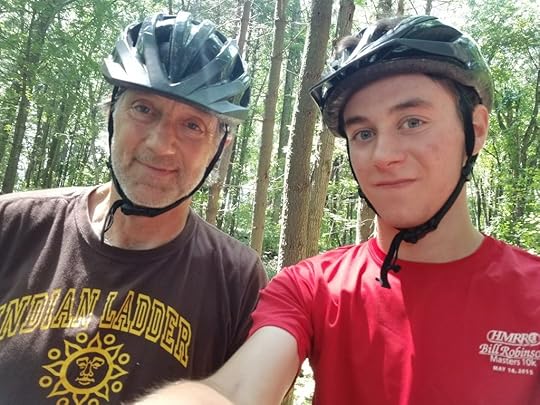 His strong moral compass helps guide me.
His strong moral compass helps guide me. Her strength and determination inspire me.
Her strength and determination inspire me.The post How COVID Has Impacted Me So Far appeared first on by David Klein.
August 5, 2020
The Posture Experiment
Like every writer, I spend a lot of time at my desk. That means hours of slumped shoulders, strained neck, and bent back. Hazards of the trade.
Today, for example. I’m deep into reading about famously unethical psychology experiments. I lean forward, I peer at my screen, I read and I read.
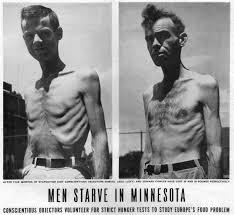 Minnesota Starvation Experiment
Minnesota Starvation ExperimentFirst, it’s the Minnesota Starvation Experiment (1944-45), which researched the effects of starvation conditions on a group of volunteers who were conscientious objectors in World War II.
Guess what? Effects negative. Most of the subjects ended up experiencing severe emotional and psychological stress. Also, social withdrawal and isolation, preoccupation with food, physiological distress, and decline in concentration and judgment capabilities–as anyone with a serious eating disorder can tell you.
I’m interrupted in my reading about the starvation experiment by the arrival of my new posture device in the mail (Go USPS!). Upright Go. Quite an inspirational name. It’s supposedly this cool little medallion you stick to your back and it vibrates when you slouch, reminding you to improve your posture. Operative conditioning at its finest.
I set it up, stick it on, and go back to work.
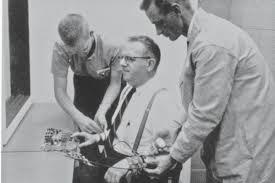 Milgram Experiment
Milgram ExperimentNext, I’m reading about the Milgram Experiment. Milgram wanted to understand how so many people came to participate in the cruel acts of the Holocaust. His theory was that people obeyed authority figures. He was right. He discovered that people were willing to deliver increasingly more painful electric shocks to other participants in the experiment when ordered to do so. Not a good look.
The device is calibrated to track my posture. I just got a gentle vibrating reminder to sit up straighter.
Then there’s the Stanford Prison Experiment. The Bobo Doll Experiment. Neither one shining a positive light on human behavior. Turns out we like to treat others cruelly when we have power over them, and little kids can learn violence through imitation.
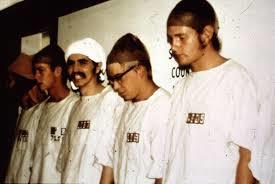 Stanford Prison Experiment
Stanford Prison ExperimentOh, what we won’t subject ourselves and others to–all in the name of learning and discovery and improving as humans.
Oops. There’s another reminder from my device. Can’t pay attention to everything. Another, this one more like a warning. More of an electric shock than a vibration. Ouch! There’s another. That really hurt. Okay, okay, I’ll sit up. Just stop hurting me.
The post The Posture Experiment appeared first on by David Klein.
August 3, 2020
THE NICKEL BOYS, Colson Whitehead
I’ve taken it upon myself to participate in Black Lives Matter. I’ve attended a BLM protest, explored my own experience with racism, made financial contributions, and tried to become more educated and empathetic to the systemic plight of Black Americans.
Within this context, I read Colson Whitehead’s THE NICKEL BOYS with high expectations. First, there was the high standard that any Pulitzer Prize winner should live up to, and second, this was Whitehead’s second time being awarded the Pulitzer (THE UNDERGROUND RAILROAD).

Whitehead is an incredible writer. He brings all the tools to work: beautiful sentences, strong characters, narrative tension, momentum, perspective, and more. And, of course, he does first and foremost what every good fiction writer must do: keep the reader’s interest by telling a compelling story. He does all of this in a novel that is only two hundred pages in length, resulting in an economical, yet brutal, reading experience.
The first part of the novel introduces us to Elwood, raised by his grandmother in Tallahassee because his parents took off without him. Turns out that kind of family tragedy is pretty common in Elwood’s orbit. But Elwood himself is smart, industrious, and a devoted believer in Martin Luther King’s dream of racial harmony and justice. He’s getting ready to start college.
But then he is arrested through no fault of his own and sent to the Nickel Academy, where boys are tortured and beaten—sometimes to death—and cruelty is as ordinary and everyday as a sunrise.
At the Nickel Academy, he meets Turner, who believes the key to surviving at Nickel is the same as surviving “out there—you got to see how people act, and then you got to figure out how to get around them like an obstacle course.”
Turner’s philosophy is juxtaposed over Elwood’s faith in King’s exhortations that Blacks can win with love. But through a series of demeaning and violent episodes, Elwood’s faith is damaged, and he and Turner set out to escape from the Nickel Academy.
What follows is the harrowing climax to the novel.
As with many novels, there is a twist, and Whitehead relies on a somewhat familiar literary device to surprise the reader. I didn’t expect it from him. I wouldn’t call this a misstep, but I would say it was somewhat manipulative and not on the same level with the overall brilliance of the novel.
5/5 Stars
The post THE NICKEL BOYS, Colson Whitehead appeared first on by David Klein.



